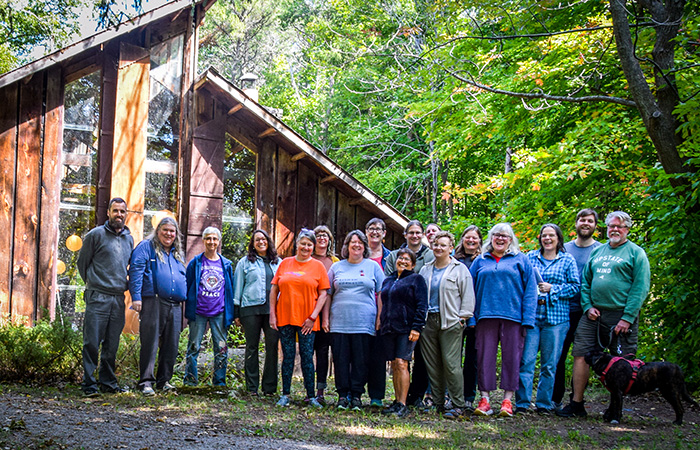“To cure myself, to find health, I must work to alleviate those sources of dis-ease and misery in the world outside. In the doing of it, however successfully or not, and in joining with myriad others in this struggle, laughter joins with tears, and creativity and hope dance once more. We become whole again.”—Simon Fisher, Practicing Peace
Helping myself, and the world, become a little more whole again.
I’ll be honest—it’s been a challenging year. We’ve seen heartbreaking images of war and genocide. Human rights have been attacked by increasingly authoritarian governments. And the US launched a trade war on countries including Canada.
A small part of me wants to despair. But a larger part knows that despair will never make the world whole. Nor will it help me. That’s why, rather than give up, I volunteer with Canadian Friends Service Committee.
CFSC is small in the face of the world’s many urgent needs for justice and healing. But it offers so much of deep value.
CFSC is the kind of grounded, principled, and active agent of peace that our world needs. So, as Simon Fisher says above, to help myself—and the world—become a little more whole again, I volunteer with and donate to CFSC.
This year you and the other supporters of CFSC contributed to some amazing peace and social justice work! Let me tell you about it.
In Ottawa you’ve been a voice pushing for a guaranteed liveable basic income. This would be a much needed support to ensure that, in these times of a rising cost of living and greater inequality, people have enough money to afford to live with dignity.
Some exciting possibilities are opening up in this work, especially with cross-party support in the province of Prince Edward Island for a demonstration project.
Our Ottawa office has been busy not just on this issue but many others. During the election we released a scorecard to help Friends see what the parties were campaigning on. And we continue to raise pressing human rights and social justice issues through submissions to consultations whenever the government of Canada prepares a budget.
We’ve raised your concerns on so many other timely topics such as civil liberties and refugee rights in many different places and ways. Shoulder to shoulder with partner organizations, this advocacy has had a real impact, as when the government withdrew the deeply controversial Bill C-2.
Again this year we sent hand-decorated cards to each and every Member of Parliament. The beautiful cards reminded them to listen and engage respectfully in governing for the good of all.
Conducting meaningful parliamentary debates in a polarized world is a topic that Canada has recently taken more of an interest in. It’s an area where CFSC has significant expertise that we’re working to share with government.
Peace and social justice work doesn’t just happen in Ottawa but across the country. Again this year, your donations made it possible to take many Indigenous rights, transformative justice, and peace actions. You’ll read about them below.
Your gifts make all of this happen. Will you give again today? Thank you!
In Friendship,
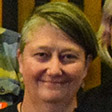
Ro Fife, Clerk,
Canadian Friends Service Committee (Quakers)
P.S. All donors over $150 this year get a special thank you gift—this awesome notepad. What makes it extra cool? Not only is it ethically sourced, but if you plant it the paper can grow wildflowers!
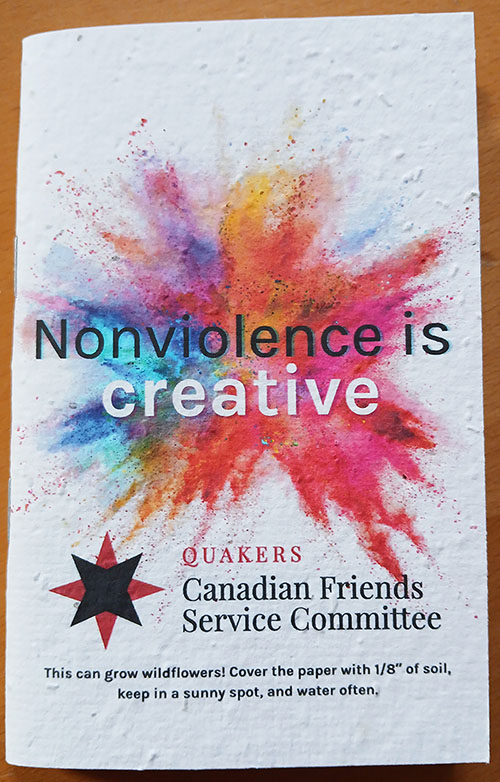
The urgency of justice and peace
The efforts you will read about are funded by individuals like you. Please, donate now.
Peace
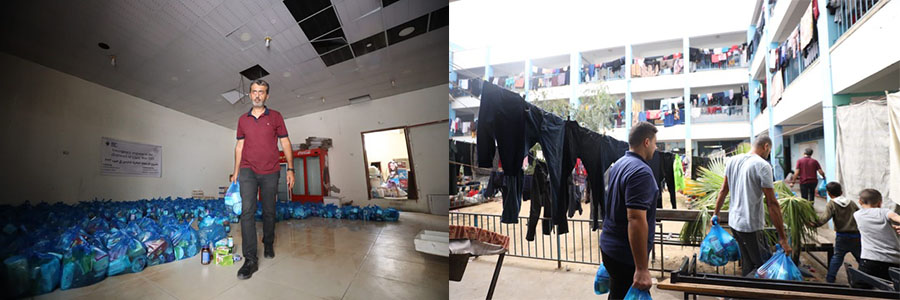
The main goal of CFSC’s peace work is to identify, engage constructively with, and transform conflicts.
Throughout the year our efforts focused on peace education and on advocacy for Canada to take a more peace-oriented role on the world stage.
The power of peace education was first broadly acknowledged in the 1970s, and it has regularly been reaffirmed in recommendations made at the United Nations since. For healthy democratic societies that value justice and inclusion, citizens need skills. We need to know how to understand problems, listen, respect diversity, and address conflicts constructively. These are all learnable skills. CFSC continues to lift them up.
Our peace program offered workshops both online and in-person, targeting community-serving groups. So far this year alone we’ve reached over 580 people.
Our practical advice, backed by many years of research, regularly impresses and surprises audiences. Some later send us stories of how the skills they learned dramatically transformed situations that had become stuck in animosity. This isn’t always possible, but it happens much more often than you might think!
All year long our series Weekly tips for better conflicts ran on social media and generated hundreds of thousands of views. Each video is around 1 minute and shares a simple (but not always easy!) action viewers can try during difficult conversations. Each action is a basic communication/conflict skill that can be used by anyone.
Over the year we saw many reactions and answered questions people had about the tips. It’s clear that people found them helpful, thought-provoking, and inspiring. These videos, combined with over 100 intentionally peace-minded social media posts, helped us reach over 6,500 people online who might never have encountered our message before.
The usefulness of this series, and its reach, doesn’t stop here. We made all of the tips available in a PDF to anyone who doesn’t like to use social media. And we created a free list people can sign up for at any time to receive one tip per week by email. The idea is that this will give people a short pause in their day to reflect on a conflict skill. If they want to, they can then test that skill out for the week.
Through content offered in presentations, interactive workshops, popular blog posts for Psychology Today, and these tips videos we’re encouraging experiments with interpersonal peace. We’re helping people to gradually build their confidence and capacity to navigate conflicts in healthy ways.
In addition to spreading peace skills, we again acted as a voice for justice and peace on pressing issues from the genocide in Gaza to the Canadian policies that contribute to violence and instability at home and abroad.
One example is our work with coalition partners on advocacy on the Private Members Bill C-233 the so called ‘No More Loopholes Act’ that looks at the way Canadian arms are still flowing (via the US) to Israel and other countries that are breaching Canada’s commitments to not arm human rights abusers.
Meanwhile Gazans are starving and the flow of food aid has been severely limited. The staff of our sister Quaker agency continue to be creative and resilient. Your donations are going to farmers in Gaza, so that they can grow food. This is then distributed where it’s needed most.
And we continue to help young Israelis access information and support when they decided to listen to the voice inside that tells them to reject military conscription.
At CFSC, we believe strongly that peace must be built both locally and internationally—which is why we celebrate opportunities to support local peacebuilding initiatives, and have provided multiple financial grants to local peacemakers and groups working for peace in their neighborhoods. This has including becoming a key stakeholder in the establishment of a new Canadian Peace Museum.
In Ottawa we’re actively engaged in the Canadian Peace Partners Network, which regularly meets with the government to try to bring a peace lens to foreign policy. This work is strategic, relationship-oriented, and long-term. Having our unique Quaker voice in the capital is critical to affecting high-level systems change.
In Toronto once again we helped provide practical and high quality advice and support services to refugees and other newcomers, free of charge.
Indigenous Peoples’ human rights
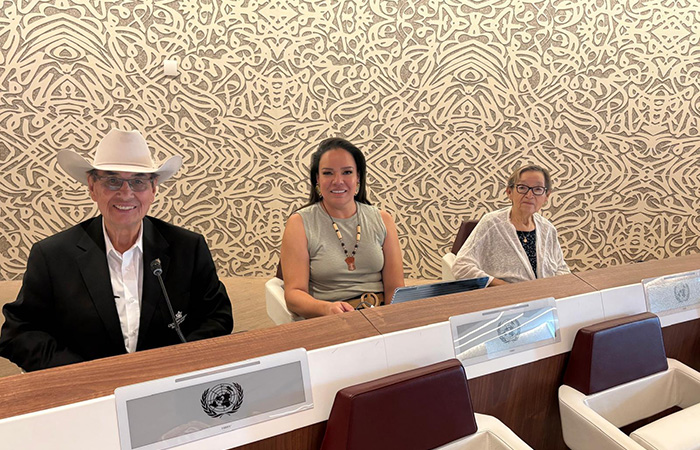
The main goals of CFSC’s Indigenous rights work are the implementation of the UN Declaration on the Rights of Indigenous Peoples and greater engagement by Canadians in the Calls to Action of the Truth and Reconciliation Commission of Canada (TRC).
One priority area—identified by our partners—of advocacy this year was the creation of an Indigenous-led human rights monitoring mechanism. Such a mechanism would be able to hear cases and act when Indigenous Peoples’ human rights are violated.
We took a bold new step in our education and advocacy this year. We placed a full page article in newspapers with millions of readers (the Toronto Star, National Post, and Globe and Mail in Ontario).
The article was also made available as a six minute podcast. These efforts shared the uplifting story of how decades of work by Indigenous Peoples—and a handful of human rights organizations like CFSC—created the UN Declaration on the Rights of Indigenous Peoples.
People need to know just how important the Declaration, which the Supreme court has said is part of Canada’s positive law, is as the framework for genuine reconciliation.
We also once again helped people to learn what the UN Declaration says through sending thousands of pocket-sized copies to Indigenous nations, organizations, schools, and interested individuals.
We wrapped up a multi-year collaboration with the University of British Columbia to learn from Indigenous Peoples about their priorities and to share this knowledge and recommendations on how to implement the Declaration. The project finished with a beautiful learning and relationship building tour of Aotearoa / New Zealand.
We continue to provide education and resources to Quakers on how to engage in the work of reconciliation. We published a report on the many actions Quakers from across Canada are taking to advance reconciliation.
This year we also began a conversation among Quakers across Canada on the payment of reparations to Indigenous Peoples. Exploring how that will fit in with our pursuit of reconciliation as a faith body will be a major focus in the coming year.
As the Truth and Reconciliation Commission’s Final Report reminds us, making individual and collective reparations is a critical part of reconciliation. We look forward to continuing this conversation to explore how reparations can fit alongside continued learning and solidarity.
Convening spaces for advocacy and dialogue also remains essential to our work advancing Indigenous rights. In New York we were once again pleased to host the Global Indigenous Youth Caucus meetings during the United Nations Permanent Forum on Indigenous Issues. The energy of these young advocates speaking truth to power inspires hope in a time of uncertainty.
In New York and Geneva, we also gathered Indigenous Peoples and governments in quiet diplomacy meetings on numerous topics including the value of Indigenous peacebuilding.
We funded grassroots cultural revitalization activities through our Reconciliation Fund again this year. ‘Nagala Donna Cranmer—a ‘Namgis master weaver—hosted a cedar weaving workshop for participants eager to learn more about this amazing tradition and her people, the Kwakwaka’wakw Nation. Four sessions of the workshop were held over two days with over 40 participants!
‘Nagala shared with us that cedar weaving is an essential part of the traditional ceremonies of her people, especially those that take place in their guk’dzi (Big House), and is key to crafting regalia. She has been cedar weaving for over 40 years. Weaving helps her find calm and let go of the business of life, to be with the cedar.
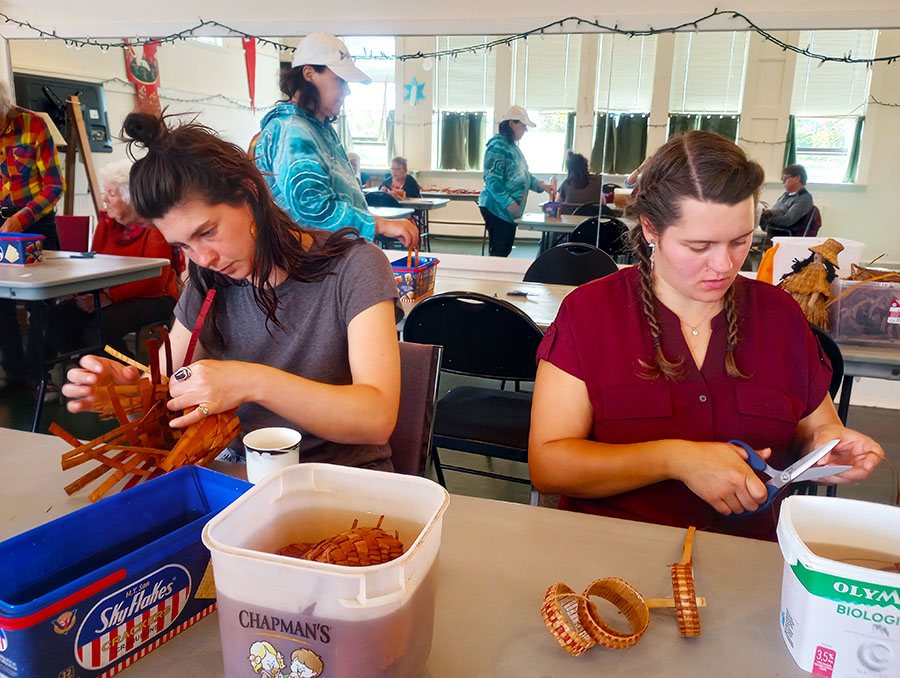
She told us it was important to her to be able to share her traditions through this workshop, which she entitled Ya̱patła̱n’s (We will weave).
“Having the opportunity to share our Kwakwaka’wakw traditional knowledge with the neighbouring community was a good experience for participants to gain a little more knowledge of the First Nations on whose territory they live.” ‘Nagala wants people to learn more to know who her People are and encourage them to see the beauty of the Kwakwaka’wakw culture.
Transformative justice
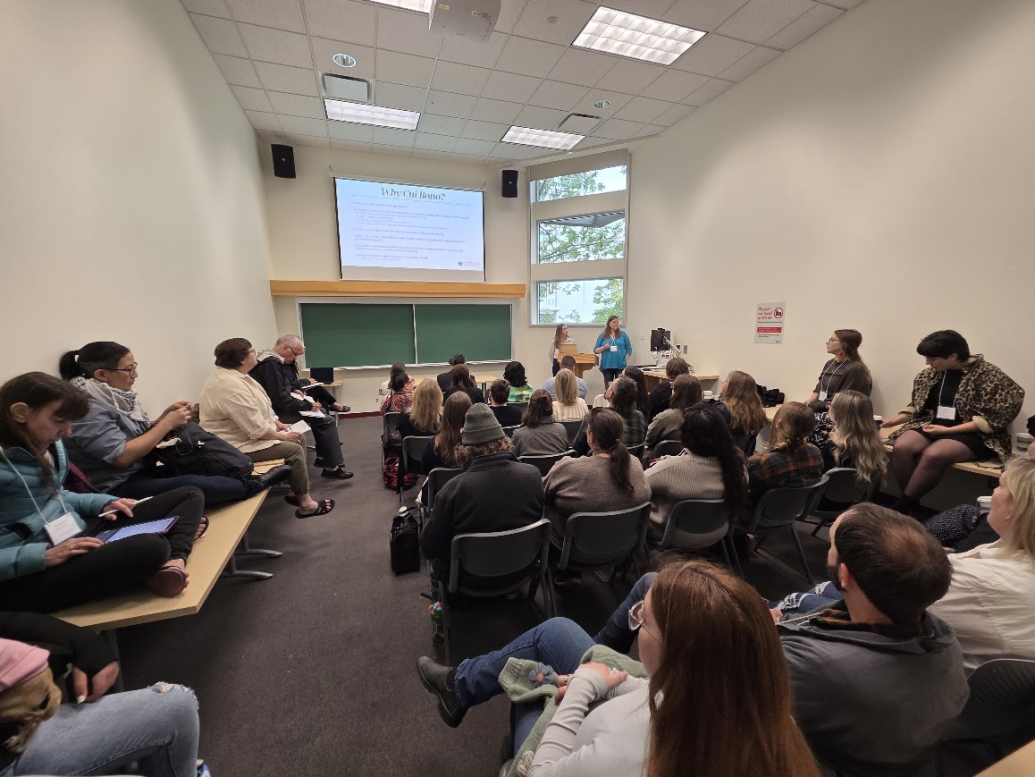
The main goal of CFSC’s transformative justice work is to eliminate the punitive mindset that pervades society and justice systems by transforming harmful approaches to ones that are healing.
This year was full of making connections. and jails. We continued to participate in consultations and on advisory groups to engage with different levels of government, with academics, and with like-minded organizations.
We were part of multiple conferences where, working with partners, we helped to bring the voices of those with lived experience of Canada’s carceral system. This conveyed much needed but otherwise missing stories to the rooms where important ideas were being generated and decisions were being made.
We’re excited to launch a new video series with one of these formerly incarcerated people—Lisa Dawn Bowden. The series shares the human story behind one person’s experiences in jail, prison, and an Indigenous Healing Lodge. Lisa is a dynamic speaker with many insights to share.
Her experiences with a Healing Lodge connect with another big piece of learning for us this year. It came from taking the time to visit several Indigenous courts. Healing Lodges and Indigenous courts give a sense that much more positive and effective approaches are possible after crime happens.
Yet Healing Lodges remain under-used and under-funded! This will be an area we seek to change moving forward.
This year we also began presenting an innovative piece of work that we’ll be publicly launching soon. It’s a first-of-its-kind report called Following the money: cui bono report, an analysis of who profits financially from Canadian federal carceral institutions. It names the companies benefitting from Canada’s prisons and jails.
When we first presented this research in Victoria, British Columbia, the session was so packed that people were standing in the hallway trying to hear. Afterward various academics and advocates thanked us for doing this work.
This has helped us continue to make connections with a range of groups who are all interested in advancing restorative practices.
We’ve continued to promote the full implementation of Canada’s new Federal Framework to Reduce Recidivism. There are many ways that communities can be kept safer by investing in effective programs that help to keep people out of prisons
We’ve sent educational information and resources to many incarcerated people and chaplains across the country.
We gave financial support to advance the work we believe in through grants to:
- the National Restorative Justice Symposium (an important event for some of the work and conversations that we believe need to happen),
- Candace House (providing support in a comforting space for survivors and families who’ve lost a loved one to violence),
- Canadian Coalition for Children with Incarcerated Parents (founded by CFSC and others this group speaks up for the human rights of children who are often overlooked),
- Rittenhouse (a transformative justice organization founded by well-known Quaker advocate of transformative justice Ruth Morris, who had a major impact on CFSC’s work as well),
- Write On! (a group that helps people connect with and write letter to people who are currently incarcerated).
And we continue to help Friends grappling with issues and concerns related to the carceral system.
Your values at work in the world
All of these efforts toward justice and peace are yours. Please, donate now.
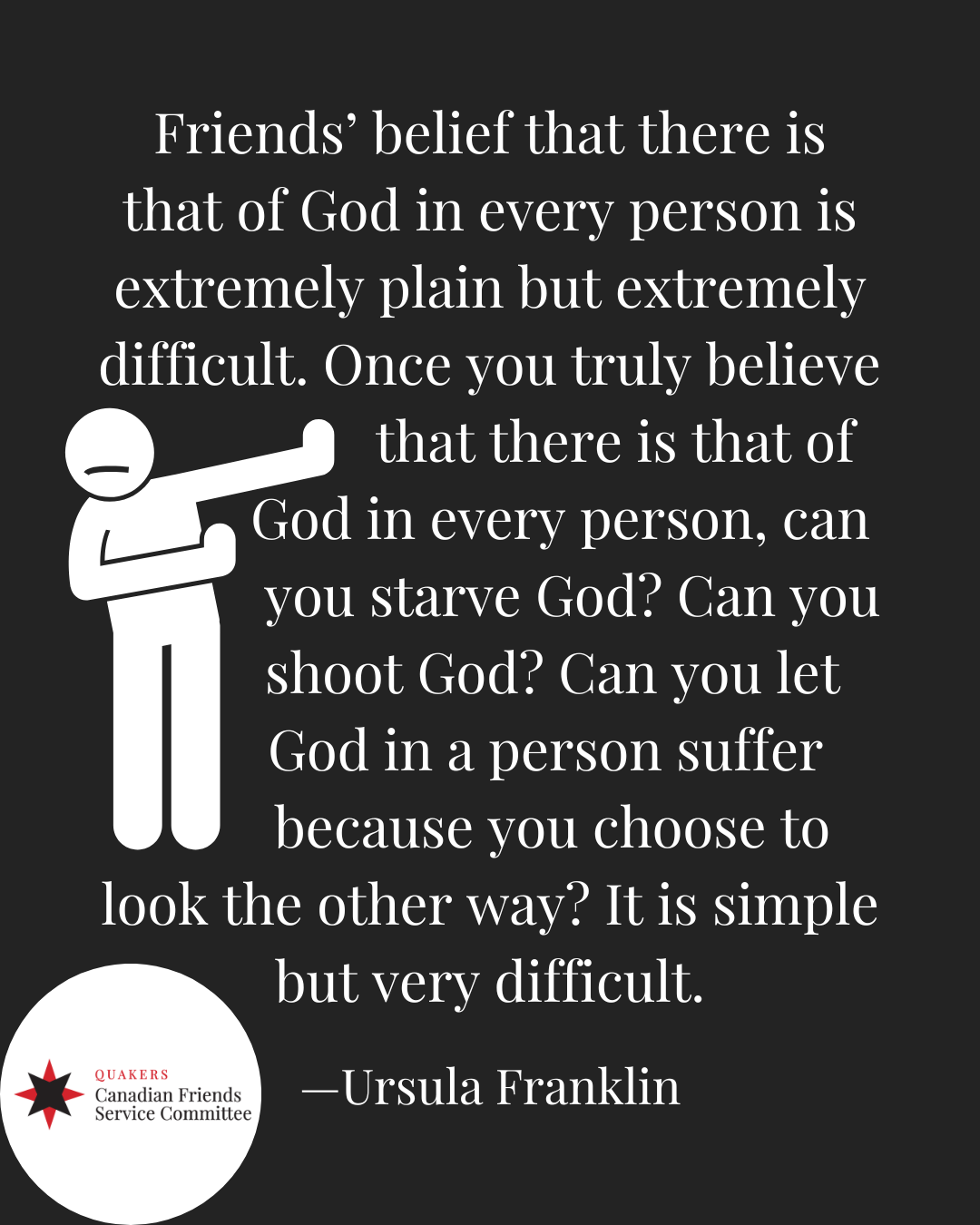
In closing
The work you support when you donate to CFSC is difficult but deeply important. It’s a testimony to the world we want: a compassionate world where we see each other and don’t look away. A world where we struggle, in laughter and in tears, to become more whole together.
What is accomplished at CFSC happens because of caring. It happens through relationships and quiet conversations. It happens because of you.
